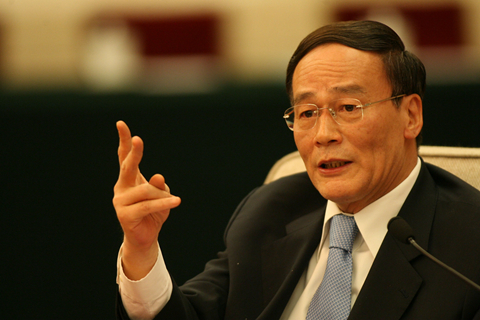Chinese Vice President Urges U.S. To Be Rational To Thaw Trade Tension

(St. Petersburg, Russia) – Chinese Vice President Wang Qishan urged the U.S. on Friday to handle trade disputes between the two countries in a sensible manner, warning that politicizing the issue would undermine market confidence.
“China is carrying out frequent negotiations with the U.S., presenting facts to try to reason things out,” Wang said during a panel discussion at the St. Petersburg International Economic Forum 2018 in the Russian city. “I feel that we are dealing with emotions in a sensible way.”
Also on the panel were Russian President Vladimir Putin, French President Emmanuel Macron, Japanese Prime Minister Shinzo Abe, and Christine Lagarde, managing director of the International Monetary Fund.
China and the U.S. declared over last weekend a truce in their threats to impose hefty tariffs on each other after a second round of talks in Washington. The two sides agreed to continue to “engage at high levels” to find a solution to their trade disputes.
Wang said the two countries must avoid a full-blown trade war because there would be no winners, though he also repeated Chinese President Xi Jinping’s earlier remarks that China “would not pick a fight, but it is not afraid of fights, either.”
“We will strive for the best possible result but also be prepared for the worst,” Wang added.
The U.S. under President Donald Trump previously threatened to impose tariffs on up to $150 billion of Chinese goods to punish the country over alleged unfair trade practices, such as theft of the intellectual property rights of American companies. The U.S. tariffs specifically targeted products benefiting from “Made in China 2025,” a blueprint announced in 2015 that aims to build the country into a global leader in advanced technology. China denied the accusations and published a tit-for-tat plan to impose its own tariffs on imports from the U.S. such as soybeans and aircraft if the American duties were to be implemented.
On Tuesday, China’s Ministry of Finance announced significant cuts in tariffs on imported automobiles and car parts. However, Washington announced a day later that the Trump administration has launched a national security investigation into car and truck imports, opening the possibility of new U.S. taxes similar to those slapped in March on steel and aluminum from countries that include China. Beijing has responded that it will “firmly defend” its interests.
Wang indicated that the U.S. needs to keep a cool head while seeking a solution to bilateral trade tensions.
“The crux of the issue could be pinned down only by going through facts and figures, instead of passing the buck to others,” he said during his speech before the panel discussion.
“Politicizing trade issues or frequently making economic sanction threats will gravely affect market stability,” he added.
Russia’s Putin at the same event also lashed out at trade protectionism.
“The logic of economic selfishness does not fit with today’s specialization of countries and companies that forge complex global industrial chains. It might throw the global economy back into the far past,” he said. “We do not need trade wars, not even temporary truces in trade wars. We need a full-time trade peace.”
Lagarde of the IMF blasted the U.S.’ demand that China massively cut its surplus with America, calling it “a strange complaint” because a country should look at its overall trade position with the rest of the world instead of its imbalance with a single nation.
“It’s really an imperative, not just for China, but for all countries that rely on trade for their growth to defend international order in which trade is operated,” Lagarde said during the panel discussion.
And taking trade disputes outside the framework of the World Trade Organization is wrong because “it’s ignoring the laws to which you’ve actually agreed,” she said. She added that any unilateral action would turn out to be a “self-inflicted wound on the economy that decides it,” pointing to the fact that previous American sanctions on Chinese tires used on trucks cost $900,000 per job saved in the U.S.
“This is not a way to go,” she said. “The cost-benefit analysis should drive to that conclusion.”
Contact reporter Fran Wang (fangwang@caixin.com)

- 1Cover Story: China Carves Out a Narrow Path for Offshore Asset Tokenization
- 2Drownings Shake Chinese Enthusiasm for Travel to Russia
- 3China Business Uncovered Podcast: A $15 Billion Bitcoin Seizure and the Fall of a Cybercrime Kingpin
- 4Over Half of China’s Provinces Cut Revenue Targets
- 5In Depth: Inside the U.K.’s China-Linked Shell Company Factory
- 1Power To The People: Pintec Serves A Booming Consumer Class
- 2Largest hotel group in Europe accepts UnionPay
- 3UnionPay mobile QuickPass debuts in Hong Kong
- 4UnionPay International launches premium catering privilege U Dining Collection
- 5UnionPay International’s U Plan has covered over 1600 stores overseas





